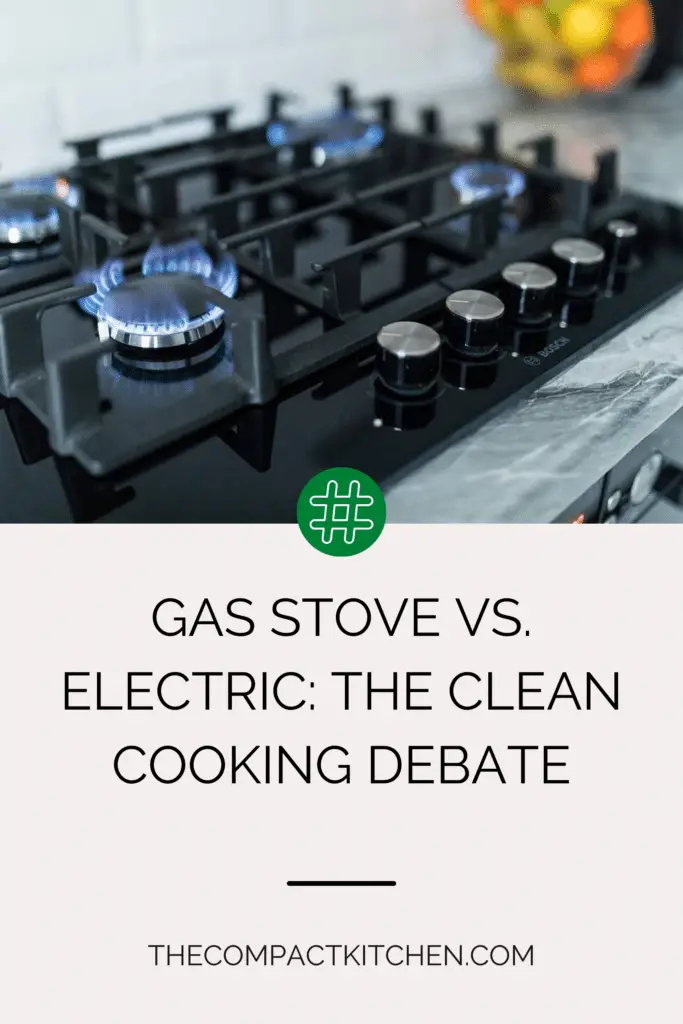Are you Team Gas or Team Electric when it comes to cooking? The debate between gas stoves and electric stoves has been ongoing for a while, with each having its own set of benefits. From quick heat control to consistent heat distribution, there are many factors to consider.
Let’s dive into the world of cooking appliances and explore the advantages of each option, including cost, efficiency, and environmental impact. Get ready to make an informed decision for your kitchen!

Introduction

When it comes to cooking, the debate between using a gas stove versus an electric stove has been ongoing for years. Many factors come into play when deciding which type of stove to use, such as cost, versatility, and efficiency. Let’s dive in and explore the benefits of cooking with a gas stove compared to an electric stove.
Understanding Gas Stoves
Gas stoves operate by burning natural gas or propane to create a flame that heats your cookware. One of the main benefits of cooking with a gas stove is the quick heat control it offers. With a simple turn of the knob, you can adjust the heat instantly, giving you more precision while cooking.

Additionally, gas stoves are less dependent on electricity, making them a reliable option during power outages. In the long term, gas stoves can also be cost-effective, as natural gas tends to be cheaper than electricity in many areas.
Understanding Electric Stoves
Electric stoves, on the other hand, use electricity to generate heat through coils or ceramic elements. One significant advantage of using an electric stove is the consistent heat distribution it provides. The even heat allows for more precise cooking, especially when baking or simmering dishes.

Electric stoves also come in sleek modern designs, adding a stylish touch to your kitchen. Safety is another key factor, as electric stoves eliminate the risk of open flames, making them a preferred choice for households with children or pets.
Comparing the Environmental Impact
When considering the environmental impact of gas versus electric stoves, it’s essential to look at energy efficiency and pollution levels. While gas stoves may be more cost-effective, they tend to produce more emissions and contribute to indoor air pollution.
On the other hand, electric stoves can be powered by renewable energy sources like solar or wind power, reducing their carbon footprint. By choosing an electric stove, you may be making a more environmentally friendly choice.
Understanding Gas Stoves
Gas stoves have been a staple in kitchens for decades, offering a reliable and efficient way to cook meals. For those unfamiliar with how gas stoves function, let’s break it down. Gas stoves utilize natural gas or propane as a fuel source, which is ignited to produce a flame that heats up the cookware.

One of the key benefits of cooking with a gas stove is the quick heat control it provides. Unlike electric stoves that take time to heat up and cool down, gas stoves offer instant adjustment of the flame. This feature allows for precise temperature control, making it easier to simmer sauces or quickly sear meats.
Another advantage of using a gas stove is the lesser dependency on electricity. In case of a power outage, you can still cook on a gas stove as long as you have a match or lighter to ignite the flame. This can be a lifesaver during emergencies or inclement weather conditions when electricity supply is disrupted.
Cost-Effectiveness of Gas Stoves
When considering the long-term cost implications, gas stoves are often seen as more cost-effective compared to electric stoves. Natural gas tends to be cheaper than electricity in many regions, resulting in lower operating costs for gas stoves over time. Additionally, gas stoves are known for their efficiency in cooking, which can help save energy and reduce utility bills.

In conclusion, cooking with a gas stove offers quick heat control, independence from electricity, and cost-effectiveness in the long run. These benefits make gas stoves a popular choice for many home cooks looking for reliable and efficient cooking appliances.
Understanding Electric Stoves
Electric stoves are a popular choice for many households due to their sleek modern designs and ease of use. Unlike gas stoves that rely on flames to heat cookware, electric stoves use electricity to generate heat through heating elements located beneath the surface of the stove.
Benefits of Using an Electric Stove
One of the key advantages of cooking with an electric stove is the consistent heat distribution it provides. The heating elements ensure that the entire surface of the cookware receives the same amount of heat, resulting in more evenly cooked meals. This is especially beneficial for dishes that require precise temperature control, such as melting chocolate or simmering sauces.

Another advantage of electric stoves is their safety features. Unlike gas stoves that have open flames, electric stoves are considered safer to use as there is no risk of gas leaks or accidental fires. This makes them a preferred option for households with children or pets, as there is a lower risk of burns or accidents.
Additionally, electric stoves are relatively easy to clean and maintain. The smooth, flat surface of electric stoves makes it simple to wipe away spills and splatters, keeping your kitchen looking neat and tidy. Some models even come with self-cleaning features that make maintenance even more convenient.

While electric stoves may have their advantages, it’s important to consider your individual cooking needs and preferences before making a decision. Some users may prefer the quick heat control and cost-effectiveness of gas stoves, while others may prioritize the safety and sleek design of electric stoves.
Comparing the Environmental Impact
When it comes to choosing between cooking with a gas stove or an electric stove, one of the key considerations is the environmental impact of each option. Both types of stoves have their own set of pros and cons when it comes to energy efficiency and pollution levels.
Energy Efficiency:
Gas stoves are often praised for their energy efficiency, as they heat up quickly and can be adjusted instantly. This means less energy is wasted during the cooking process, making gas stoves a more cost-effective option in terms of energy consumption. On the other hand, electric stoves can be less energy efficient due to the time it takes for them to heat up and cool down, leading to potential energy wastage.
Pollution Levels:
When it comes to pollution, gas stoves have been known to emit indoor air pollutants such as carbon monoxide and nitrogen dioxide, which can be harmful to your health if not properly ventilated. However, newer models of gas stoves are designed to be more efficient and produce fewer emissions. On the other hand, electric stoves do not produce any indoor air pollutants, making them a safer option for indoor air quality.

Overall, when comparing the environmental impact of gas stoves vs. electric stoves, it’s important to consider the full lifecycle of each appliance, including production, transportation, and usage. In some cases, electric stoves powered by renewable energy sources can be a more eco-friendly option compared to gas stoves. By choosing the right stove for your kitchen, you can reduce your carbon footprint and make a positive impact on the environment.
Benefits of Cooking with a Gas Stove vs. Electric
Gas and electric stoves are two popular choices for cooking appliances in households around the world. Each type of stove comes with its own set of benefits and considerations that should be taken into account when deciding which one is right for you. In this section, we will delve into the key takeaways of cooking with a gas stove versus an electric stove, highlighting the advantages of each option.
Gas Stove Benefits
One of the main benefits of cooking with a gas stove is the quick heat control it provides. With a gas stove, you have the ability to adjust the flame instantly, allowing for more precise cooking temperatures compared to electric stoves. This quick responsiveness is particularly advantageous when cooking delicate dishes that require precise heat adjustments.

Another advantage of gas stoves is their lesser dependency on electricity. In the event of a power outage, you can still use a gas stove to cook your meals, providing you with a reliable cooking option when electricity is not available. Additionally, gas stoves are often considered cost-effective in the long run, as natural gas tends to be cheaper than electricity in many areas, potentially saving you money on your utility bills.
Electric Stove Benefits
On the other hand, electric stoves offer significant benefits of their own. One of the key advantages of using an electric stove is the consistent heat distribution it provides. Electric stoves heat up evenly across the entire cooking surface, resulting in more even cooking and better results for dishes that require even heating.
In addition to their heating capabilities, electric stoves often come in sleek modern designs that can complement a contemporary kitchen aesthetic. The smooth glass or ceramic cooktops of electric stoves add a stylish touch to your kitchen, creating a modern and streamlined look.

Electric stoves are also considered safer to use than gas stoves due to the absence of open flames. This can provide peace of mind for those concerned about potential fire hazards in the kitchen, making electric stoves a popular choice for households with young children or safety-conscious individuals.
Overall, the choice between a gas stove and an electric stove ultimately comes down to personal preference and individual priorities. Consider your cooking style, aesthetic preferences, and environmental concerns when deciding which type of stove is the best fit for your kitchen. Whether you prioritize quick heat control and cost-efficiency with a gas stove, or consistent heat distribution and safety features with an electric stove, both options have their own unique benefits to offer.
Deciding Your Culinary Destiny
In the age-old battle of gas vs. electric stoves, the choice ultimately boils down to your unique needs and preferences. Whether you prefer the instant heat control of a gas stove or the sleek design of an electric one, there are benefits to be had on both sides.
Consider your cooking style, aesthetic taste, and environmental impact when making your decision. Whichever you choose, the joy of cooking will always remain constant. It’s time to ignite your culinary creativity and savor the delicious journey ahead!








